|
There are only a few people whom I look at in biblical history and identify with on an average-human-level. It can be hard to find personal connections to many saints and holy people for me. Some were ordinary and humble, but others were so extraordinary and left big shoes to fill. It can be challenging to wrap your head around their sanctity—I know it is for me. When I hear about St. Martha though, I think, “Yes, she’s my girl.” Martha had close friends and pesky siblings, and when important company came over, she was mad no one was helping as she cleaned and cooked herself into a tizzy. She was so human, so relatable.
St. Martha, her sister Mary, and their brother Lazarus were close friends of the Lord. We hear about them from Luke’s Gospel: As they continued their journey he entered a village where a woman whose name was Martha welcomed him. She had a sister named Mary [who] sat beside the Lord at his feet listening to him speak. Martha, burdened with much serving, came to him and said, “Lord, do you not care that my sister has left me by myself to do the serving? Tell her to help me.” The Lord said to her in reply, “Martha, Martha, you are anxious and worried about many things. There is need of only one thing. Mary has chosen the better part and it will not be taken from her. This is such a great passage. It shows the humanity of these average people. It contrasts Martha, the burdened preparer and host for the occasion, with Mary, the one who sat with and listened to their wise friend, Jesus. It is a chance for those of us who get frazzled to stop for a moment and listen to the Word of God. It is a chance for us to not only let Jesus into our homes, but also into our hearts as well. Martha is so relatable. In a later moment in John’s Gospel, we hear about Martha taking a completely different approach to the Lord’s arrival. This time, he is met with her sadness but also her faith. This is a big moment for Martha. She seems to have learned to trust and believe, and thus Christ’s arrival brings hope for her even after the death of her brother. She tells Jesus that if he had been here, Lazarus wouldn’t have died, but has hope and faith that everything will still be okay. Jesus responds, “Your brother will rise.” Martha said to him, “I know he will rise, in the resurrection on the last day.” Jesus told her, “I am the resurrection and the life; whoever believes in me, even if he dies, will live, and everyone who lives and believes in me will never die. Do you believe this?” She said to him, “Yes, Lord. I have come to believe that you are the Messiah, the Son of God, the one who is coming into the world.” From this we hear St. Martha echo her own “fiat” with the words, “Yes, Lord.” This is when we see her inner beauty emerge. Her old self, prone to complaining and anxiety from hosting, has been replaced by faith. I find a lot of comfort knowing that St. Martha was imperfect and struggled—even when Jesus was in her home. Her feast day is July 29th, the day before my birthday, and I feel more connected to this saint than ever before. It wasn’t the first time that Jesus entered her home or that she listened to his words. It also probably was not the second or third time she had interacted with him, being close friends. But when the moment came for her to have hope in the Lord, she did. Patience and sitting with Christ, like her sister Mary did, might be another way to sainthood, but for Martha, her heart was not as ready to accept Him then. Her human imperfections kept her from that. Her path to sainthood was a journey comprised of moments of faith and trust, as we saw in her conversation with Jesus after Lazarus’ death. She shows us that, though we can’t always be perfect, our call to sanctity begins with the words, “Yes, Lord. I have come to believe...”
0 Comments
During my formative years, I had the distinct privilege of spending time with my grandads and even one great-grandad. In the late 1950’s and ‘60’s, our pace of life and activities was very different from today. We attended school and church, but a lot of our time was centered around our home. Even more unique were our regular visits with extended family on a weekly basis. This afforded me time to be in the company of my grandparents frequently. I listened to their talk about work and how they solved problems and the things that occupied their time. I enjoyed accompanying my dad’s dad on outings to pick blackberries and then had the pleasure of helping in the process to make wine in his cellar. My Grandpop was a nuts-and-bolts kind of man, always busy with his work as caretaker of the cemetery, keeping their only vehicle (an old Ford truck) running, and maintaining the house where he and my grandmom raised thirteen children. It was fascinating learning things from him. I would follow him around and help load coal into their furnace and collect items from the cool cellar that housed their canned vegetables and held Grandpop’s workbench. He liked to show any of us grandkids the things he did for work, as well as the projects he worked on, such as building cedar benches for anyone who wanted one and making wine from the fruits he picked. They lived a hop, skip and a jump from the monastery church and school where they walked to 6am daily Mass. By society’s standards, Pop was minimally educated and made a meager wage that kept them in the lower economic level their entire lives. The gifts we received were hand-made and simple, but lots of time was invested in being family together. I loved being in Grandpop’s shadow and considered the cemetery near their house to be the most magical place in my world with its little streams and bridges and huge fir trees and rolling hills. Amongst those resting in peace, my dad and his twelve siblings grew up under the tutelage of my grandpop’s calloused hands and the soft-spoken voice of my grandmom. My grandmom’s parents lived just three blocks away, and my great-granddad was a successful stone mason with a shop full of heavy, rough-hewn tools that carved important information into big pieces of granite for the deceased. As an adult, I realize how fortunate I was to have enjoyed weekly visits to my great-grandparents. Great-granddad was a tall, polite, and loving man. He would sit me atop a piece of stone and include me in the conversations with my dad and other family. He had two framed pictures over the desk in his shop – the Sacred Heart of Jesus and the Immaculate Heart of Mary. As a kid, I always felt that they were watching me. These images hanging in a prominent place in his shop spoke volumes about the faith my great-granddad had. No matter how busy he was, he had a way of making me feel cherished when we came by. And a visit never ended until he sent us up to the house to get a drink and a slice of cake from great-grandmom. My mom’s dad was another wonderful grandfather with whom I spent much time while growing up. (I never met my grandmom because she died suddenly only three months after my parents were married.) Pop was a tall, handsome man who always wore a suit, and I mean always! He was retired from the phone company and had raised five children through the Depression era. His parents and aunt lived with them in a small but comfortable row home. Most of my time spent with Pop was at our house where he would come most days in the afternoons and stay through dinner. Sometimes we would pick him up at his apartment and I loved seeing his stuff. He was an avid follower of the Baltimore City Fire Department and had a squawk box to hear all the fire calls. He had boxes with index cards full of information on the different fire houses, calls, and each fireman. When my mom was growing up, he would pile the kids in his car and they would go watch the firemen fight fires. He supported the firemen with visits and gifts and had a deep respect for what they did for the community. I loved sitting at his feet in our living room listening to him tell stories of growing up in Baltimore and of his family. He was a regular member at our dinner table in his later years and always took an interest in my studies and in the things I was doing. When my parents would go away on their annual business trip, Pop would come take charge of our household. He made flapjacks for breakfast, walked me to the school bus stop and would meet me there each afternoon. I didn’t need an escort, but it was his way of sending me off. He played cards with us and told stories and made the best stew I’ve ever eaten! He made sure to remind me to say my prayers and he took us to church. Pop was present for all the holidays throughout the years, along with a lot of aunts, uncles, and cousins. Our house was the typical gathering place for my mom’s siblings and so I guess that’s why Pop always came over. In his later years when he could no longer drive, my parents wanted him to move in with us, but he insisted on his own independence and lived out his days, until he died at 89, in his apartment. As a kid, I never thought twice about Pop always being at our home. As an adult, I look back and see the treasure I had in being loved by a man who had all the time in the world to talk. It impacted me more than I realized. Mom and dad took care of the needs of the family, but Pop took the time to share himself with me and take an interest in what I was thinking as a young girl trying to figure out what was important in life. A generation removed, Pop made it abundantly clear how important each member of the family was to him, which instilled in me a strong desire for continued close family bonds in my adult life. I then watched how my dad became granddad to my six children. He was busy seven days a week and lots of nights running his business and providing for our family when I was a child, but as a granddad, he learned how to switch gears and devote attention to his grandchildren through time spent together. He took his role as grand patriarch seriously and lived out sharing the gospel of Jesus with all his grands in very simple but tangible ways. He was a great encourager of all the pursuits of each one and never hesitated to share his testimony of how God helped him on a daily basis to do what he was supposed to do. He shared prayers and taught them the power of talking with God all day long. And when my parents visited for two to three weeks each Christmas season, everyone could see how he laid out his days. He would be seen in a quiet chair early in the mornings with his well-worn prayer book praying his prayers. Then he and mom would attend morning Mass with any of us who would accompany them. He joined in our family prayer time and nightly Rosary. I have also enjoyed witnessing my husband embrace the role of Pops to our sweet grandchildren. He rejoices in the gift of each one and prays daily for them to always hear and respond to God’s call on their lives. He loves playing with them and particularly sharing his love of music with them. The treasure of knowing my granddads and being so loved by them has been a gift in my life that I know has helped me understand the love God our Father has for me. The beauty of the continuous bond from great-grandfather to grandfather to father is powerful and assures me of my heritage. The greatest lesson I learned from these loving men was to invest yourself in others and especially to build up and encourage each member. It doesn’t seem mighty or grand, but it strengthens the foundation of our lives and nurtures deep, holy growth in our specific God-ordained purpose. The richness of a grandfather’s love and care is a gift in the family. Their patriarchal leadership and security are God’s design for how families are enjoined together through the generations and meant to relate. I have had the privilege of this delightful heritage and my prayer is that it will continue to be nourished by the fathers to come in our family. For more resources on Marriage and Family, please click here. To learn more about the Year of St. Joseph, please click here. 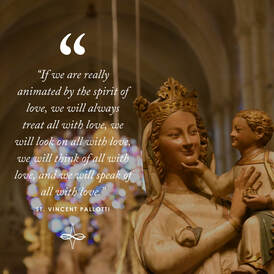 What motivates us to do what we do? If it is love, then we are called to “will the good of another” (St. Thomas Aquinas quoted in the Catechism of the Catholic Church, 1766). The object of our love is not ourselves or our self-interest. It is God and neighbor. St. Vincent Pallotti universalizes love in this way: “If we are really animated by the spirit of love, we will always treat all with love, we will look on all with love, we will think of all with love, and we will speak of all with love” (OOCC III, 338). This type of love requires sacrifice and generosity. Of course, the greatest act of love was the sacrifice of Christ on the Cross. We see generosity and sacrifice in the Blessed Virgin Mary saying “yes” to the Angel Gabriel and St. Joseph setting aside what he wanted to do and always doing the will of God. Sacrificing ourselves for the other, thinking not of self, but the other, is not a typical way of behaving. We seem to be able to do it on a small scale with those closest to us, which is the place to start. Bit by bit, through self-sacrifice, a generosity of spirit grows, love grows. Does this happen on its own? No, the Holy Spirit is moving in and through each of us. The grace of God gives us the ability to sacrifice and be generous, moving us toward universal love. May the charity of Christ urge us on!
When the COVID-19 pandemic began and so much seemed outside of my control, I turned to prayer as a source of comfort, nourishment, and stability. Favorite Catholic podcasts, powerful homilies, Gospel-inspired music, Scripture reading, and devotions like the Rosary kept me grounded in a higher reality than the confusing, dark, and humbling one I faced. Perhaps I felt the need to overcompensate in a time when I couldn’t physically receive the Eucharist. The lack of physical Communion meant I searched for spiritual, mental, and emotional communion with the Lord in other ways I found fruitful. In this way, times of trial can bear much fruit—suffering sharpens our eyes to the eternal and true. It is sobering. Surrendered to God, suffering can be the most direct path of conversion and redemption. As the pandemic continued and I was able to adjust to my new “normal,” my sense of emergency slowly began to fade. I found ways to be comfortable and to continue meeting needs like friendship, worship, and rest. No, everything was not as it had been. Life was still a shadow of its former glory. And yet, I had found ways to cope. As this trajectory continues with the reopening of society in many ways, I have begrudgingly found that my deep prayer life has slowly faded. Becoming more of a checklist than a time of renewal, my prayer time is filled with distraction and noise. I’ve come to realize that I would rather fill my time with the noise—albeit good noise—of a Catholic podcast or homily instead of turning everything off and filling my time with God Himself. I’m more comfortable hearing others talk about God and their spiritual insights than talking to God. I’m also more comfortable talking AT God than WITH Him. I have a lot to say, but am not spending time listening or receiving. Finally, once I do settle down to pray, my tasks, chores, and rambling thoughts bombard me. My prayer time is filled with noise and distraction. Why is it easier for me to scroll through a newsfeed of beautiful images and consumer goods than to thumb through my Rosary meditatively? Why is it easier to respond at all moments to the latest texts in a never-ending group thread than it is to respond at all moments to the promptings of the Holy Spirit? Why is my heart more easily captured by the words of the media than by the Word of God? For perhaps the millionth time, I must face again a thorn in my side that prevents me from greater holiness: noise. “Noise, the grand dynamism, the audible expression of all that is exultant, ruthless, and virile—Noise which alone defends us from silly qualms, despairing scruples, and impossible desires,” says the demon Screwtape in C.S. Lewis’ classic, The Screwtape Letters. He continues, “We will make the whole universe a noise in the end. We have already made great strides in this direction as regards the Earth. The melodies and silences of Heaven will be shouted down in the end.” Lately in my life, it seems like Screwtape and his friends are succeeding. I’m having trouble hearing the melodies of Heaven amidst all the noise. And can’t we all admit to knowing this deep down—that much of our lives is an endless stream of noise and distraction threatening to drown out the still small voice inside? I reflect on these things once again while reading a powerful book and meeting virtually with other women--This Present Paradise: A Spiritual Journey with St. Elizabeth of the Trinity. Elizabeth, through the author Claire Dwyer, is shaking me from my complacency and passing through the distractions to help resurrect my heart. This young French Carmelite nun who lived over a hundred years ago mastered the interior life of prayer and encourages all to do the same—regardless of their vocation in life. I know I am called to more than what I’m filling myself up with; an hour of scrolling through items on sale or watching a home renovation show will never compare to fifteen minutes of virtual Adoration or a few decades of the Rosary. Any time consecrated to God is not returned unsanctified. In times of greater stability, comfort, or complacency, I’m also reminded of the Scripture passage about the wise virgins at the gate. We are called to fill our lanterns with oil as we await the Bridegroom so that we will be prepped and ready for His return. I have personally found that my preference for news feeds, shows, or internet browsing fills my lantern with something akin to water rather than oil, and so I am using this season of Ordinary Time to recommit to a quieter, more fruitful prayer life. Below are a few things I have found helpful for overcoming spiritual distraction and ensuring daily prayer:
As the world continues to reopen in ways that give us hope, I invite you to reflect on your prayer life throughout the pandemic months and set goals for yourself during this season of Ordinary Time. In the end, may we find that the melodies and silences of Heaven triumph over the noise of the world.
As I write this, my laptop is balanced precariously on my knees because there is no longer space on my lap. My baby girl presses into my belly button with each hiccup, and I can’t help but think about her arrival. In the next three weeks, I will feel her hiccups against me from the outside. I will know her hair color and her features and I will breathe in her perfect newborn scent. Until then, I cherish the last days of my two-year-old being the baby, of my family being one of six instead of seven, and the time I have to prepare for her to enter the world.
First time mothers and mothers of many can easily relay their baby preparedness to-do lists: rinse the onesies, install the carseat, visit the doctor again. Physically and mentally, we work to be ready to welcome the sweet new life we created. I’m embarrassed to admit that I did not make plans around my spiritual readiness for a newborn until the birth of my fourth child. In all of my business preparing my mind and body for labor and delivery, God’s role in this life-event has been a mere afterthought. Confessing this to other mothers and mothers-to-be has revealed that I am not alone in this oversight. Being consumed by the physicality of what is happening to our bodies can edge out any focus on what is happening to our spirit. This time, I’m changing that. Through Seeking-Truth In Jesus Calling: Enjoying Peace in His Presence, Sarah Young writes, “When you seek My face, put aside thoughts of everything else. I am above all, and in all; your communion with Me transcends both time and circumstances. Be prepared to be blessed bountifully by My Presence, for I am a God of unlimited abundance.” The process of labor, delivery, and early mothering is one of humility. I deeply desire a window into the future so I can know and prepare for the date and time this baby will come, how delivery will go, and what the outcome will be. Of course, these are things I cannot know. By seeking Truth in His face, in the Word, and in the sacraments, I am invited to rest in the peace of what I do know: my baby and I are seen and known by the God of abundance. He alone knows what is to come, and His plan for me is good. Through Worship This truth leaves me in awe of our God, and I cannot help but to praise Him. My favorite form of worship is music, and I want to bring that into the delivery room. With each contraction, I can lose myself to the words celebrating His presence in the pain. It reminds me of His strength when I feel that I have come to the end of my own. Words of praise will be some of the first my baby hears. My labor playlist is available for you here. Through Prayer One of the many gifts of prayer is its communal nature. This has been a beautiful way to invite those we love into the process of preparing for the birth of our baby, and even into the delivery room. This pregnancy, we have invited our loved ones to pray a novena leading up to the baby’s due date. Our child’s godparents alongside many of the friends who witnessed our wedding, and vowed to help uphold us in our vocation to family life, will join us in the novena to Saint Mary Magdalene, praying for the safe delivery of our baby. (It starts today-- join us!) Other favorite prayers leading up to labor and delivery include: -St. Gerard Majella Novena for Expectant Mothers -Novena to Mary, Mother of God -Prayer for the Birth of a Child We invite our friends to pray for us, but we also invite them to offer their intentions so that we might pray for them. As Catholics, many of us are familiar with the phrase "offer it up." This means that we can enter into the redemptive suffering of Christ when we "offer up" our own suffering, work, or joy. The Catechism says, “The cross is the unique sacrifice of Christ, the ‘one mediator between God and men’ [1 Timothy 2:5]. But because in his incarnate divine person he has in some way united himself to every man, ‘the possibility of being made partners, in a way known to God, in the paschal mystery’ is offered to all men (618).” It is my hope to offer up the pain of childbirth for the cares and concerns of the people we love the most so we ask: How can I "offer up" the end of this pregnancy and my labor for you? Preparing my heart to walk alongside Jesus through the last days of pregnancy, childbirth, and recovery is the most important preparation I can make. Together with my Heavenly Father, the onesies will be cleaned and the hospital bag packed. In His presence, this child will come into the world with praise. My life and hers, our being, our all, are in Him and with Him, and for Him. And so, Amen. For more resources on Marriage and Family, please click here.
7/13/2021 Creating Memories: A Grandfather Reflects on His Role During the Year of St. JosephRead NowWe come in all colors, shapes, sizes. We come with many different names: Papa, Gramps, Granddaddy, Baba, Nonno or maybe even Skipper. The one thing we all share is our unconditional love for our grandchildren. One of my earliest memories of my grandfather Tony (Gramps) was sitting on his lap as he prayed the rosary. As l tried to pull it from his hands, he clutched his beads even tighter. I guess that was my first memory of prayer. When my wife and I had our first child, Gramps told me the 3 greatest things a grandfather can give his grandchildren are love, spoiling them rotten, and memories. I cherish the memories of Gramps to this day: sleeping over at my grandparents’ house, having my picture taken with him at my First Holy Communion, cutting his grass and him giving me a quarter, him asking me to sit next to him at his and grandma’s 40th anniversary dinner, and even taking my then-fiancée when I went to shovel his snow. These are some of the memories he created for me. My dad and father-in-law enhanced the grandfather experience for me as I watched them with our children and their cousins. Birthday parties, school plays, receiving the sacraments or graduations, grandpas were always there. At his grandkids’ Confirmations, my father-in-law would say “Another soldier for Christ”–adding more memories to my collection. l wonder what memories Jesus had of His grandfathers Joachim (the Patron Saint of Grandfathers) and Jacob, St. Joseph’s father. Did He pull on their prayer beads, sleep over at their houses, sit next to them at special occasions? As it becomes my turn to make memories, I pray to St. Joseph that my 4 precious grandchildren will have memories: a picture of us at their First Holy Communion, attending Mass together, me walking them to school or picking them up after school (well maybe after the pandemic), me telling them a corny Papa joke, them giving me a running hug, me spoiling them rotten or maybe even them tugging on my rosary. The aforementioned men have set the bar very high; it is my goal to follow in their footsteps. I remain extremely grateful every day that l have been entrusted to be the Papa of Mabel, Anna, Teddy and Lucy. In the year that Pope Francis has declared the Year of St. Joseph, my best hope would be that St. Joseph gives me the strength to teach them the ways of the Gospel and lead them down the path towards Christ. To me St. Joseph was like an unsung hero. His devotion must have been unwavering. Asked to be the earthly father to Jesus and husband of Mary, WOW!! what a responsibility. Teaching Jesus his trade as a carpenter, teaching Him to pray, preparing Him for manhood, things that many may overlook. St. Joseph simply did the things asked of him by God. God’s love shows through in picking Joseph for this oh so important role in Jesus’ life and the life of the Church. The more I read about St Joseph, the second J of the JMJ (Jesus, Mary and Joseph) I wrote at the top of my school papers long ago, the more awesome I think he is. He did so much without questioning his role. Thank you, St Joseph, for being an inspiration and guiding light as I navigate the waters of being a grandfather. St Joseph, pray for us (especially us grandfathers). To learn more about the Year of St. Joseph and our Fatherhood Series, please click here.
When you hear the word ‘hospitality’, what comes to mind? Like most people, I bet you think of hotels, or in some cases, you may think of that one aunt you have who always makes sure everyone’s glass is full and everyone has a seat. If you’re in ministry, ‘hospitality’ may now be synonymous with having coffee and light pastries at early morning meetings. But in a Benedictine sense, hospitality is very different. July 11th marks the Church’s feast of St. Benedict. In the early sixth century, St. Benedict wrote a Rule that he wanted his monks to follow. In 73 short chapters, St. Benedict tried to lay out an entire monastic way of life, so he certainly had a lot of ground to cover. He wrote about everything; from how an abbot should be chosen to how much monks were to eat and drink and where they were to sleep. He also devoted an entire chapter to how guests were to be received and treated. This whole chapter, which is quite brief, can be summed up in the first phrase the Founder writes, “Let all guests who arrive be treated as Christ…” (Ch. 53). Benedict goes into specifics on how guests are to be welcomed and fed, but it all goes back to Christ Himself saying “I came as a guest, and you received Me” (Mt. 25:35). St. Benedict understands, and wants his monks to understand, that Christ can be found in everyone. The first phrase of the last paragraph is a perfect summary of the Gospel message as well, “In the reception of the poor and of pilgrims, the greatest care and solicitude should be shown, because it is in them that Christ is received…” (Ch. 53). How do we treat the stranger on the street, the man selling us a magazine, the immigrant, or the receptionist? Remember also, this does not apply to just the stranger. How do we treat those that we see every day: the coworker, roommate, friend, or classmate? Are these people just a means to an end, are they here for our convenience or happiness, or are they Christ to us? Are we treating them as Christ incarnate or just as another person we have to deal with? Most likely we do not fall into either extreme, but every time we fall short of treating a person as Christ, we fall short of treating God as God. To be hospitable, we do not need to follow the exact instructions of St. Benedict. Our hospitality, like his, should be rooted in charity, in love. It can be quite simple: a smile, a since greeting, or the most common one at my alma mater, the holding of a door for a distant stranger. Hospitality is the easiest way to build up the Kingdom of God here and now. When we welcome the guest, greet the stranger, or feed the hungry, we are doing these things for both God and neighbor. By being hospitable, we are fulfilling the greatest commandment. Let us pray for the intercession of St. Benedict today, asking him to pray for us, that we may be hospitable, welcoming, and loving in every interaction we have. To learn more about St. Benedict, please visit our Catholic Feast Days site. **This post was originally published on July 10, 2014** AuthorBr. Titus Phelan, O.S.B. of St. Anselm Abbey.
Over the last several years of my life, I have read, studied, and written hundreds of pages about what Pope Francis meant when he said in Evangelii Gaudium that “The Church will have to initiate everyone – priests, religious and laity – into this ‘art of accompaniment’ which teaches us to remove our sandals before the sacred ground of the other” (169). However, nothing has ever taught me more about accompaniment than one of the most special people I have ever known in my life: my grandmother.
My grandmother, Edith Lauritzen, was born a second-generation Irish Catholic in 1928 in Queens, New York. She was soft-spoken but had a hearty laugh that made an appearance in most conversations. Her favorite food was Chicken Parmesan, and she taught me the first prayers I ever learned. Sometimes, my grandmother would pick my sister and me up after school and treat us to ice cream. She would ask us about our day at school, and listen generously, as if the happenings of my sister’s and my days at elementary school were the most riveting and important things she could devote her time to. I spent a good bit of my early childhood with my grandmother, and when my grandfather passed away, she moved in with my family to a small bedroom on the first floor of our home. In our house, my grandmother was a steady presence in my life; her warmth, laughter, and joy were always a comfort. I enjoyed spending time with her and would sometimes wake up early in the morning if I heard her making her breakfast of toast and coffee in the kitchen just so that I could spend time with her. As I grew up, our shared Catholic faith became a topic of frequent conversation. In middle and high school, I remember spending hours talking with her in her bedroom. My grandmother’s room was small, with space only for her bed, dresser, and an armchair. The feeling of my foot falling asleep sticks with me as I reflect on talking with her, as sometimes our conversations lasted hours as I sat cross-legged on her wooden floor. Beyond some vague memories of the topics of prayer, the lives of the saints, and my hopes to visit St. Peter’s basilica one day, I do not remember anything specific about the topics of conversation. Rather, what rises to the surface in my memory of those conversations with my grandmother is her listening, her interest in my thoughts, and her joyful, warm presence that created the space for me to speak up and share my insights with a woman with 65 more years of life experience. Now, I look back and know that I might have spoken with a little too much certainty about God and the things of faith, and probably mused a little too grandiosely about my reflections on what certain Gospel readings meant. However, that didn’t matter to my grandmother. This was the gift that my grandmother gave to me: taking my faith, questions, and thoughts seriously. My grandmother could have seen my early, inexperienced love of my faith as childish or naïve. Instead, I think she saw my faith as wisdom, blooming and in process, attempting to make sense of God and life. In front of my grandmother’s armchair and unbeknownst to us both, my vocation as a theologian and woman of faith was being nurtured and cultivated. After my first year at college, my family had to move my grandmother to an assisted living home as she needed more care than we could provide at my house. I was devastated. My home felt like it lost a little bit of warmth. However, that first summer after my freshman year of college, I made it part of my daily routine to visit my grandmother. I spent afternoons with her, listening to her thoughts and reflections on her life, her stories about growing up with the other children in her neighborhood in Queens, and her relationship with my grandfather. We laughed as she told stories about living in New York, what it was like to go to Mass in Latin, and why she loved St. Thérèse (her favorite saint). Before moving to the assisted living home, my grandmother had never lived away from home, so sometimes, she would cry. I learned in those moments that what was important was not me offering some nugget of wisdom from our faith that would help her to reframe her thinking, but for me to be there, hold her hand, and be present. In the days after those afternoons where there were more tears than laughter in her voice, I would make sure to bring her a cup of chocolate ice cream to lift her spirits. It did not take long for me to realize it was now my turn to accompany my grandmother, just as she had accompanied me in my childhood and teenage years. Two summers later, my grandmother passed away. It was one of the most painful days of my life. At the same time, I was overjoyed at the thought of my grandmother getting to experience something so much better than our hours of conversation together about our faith: God himself. At my grandmother’s funeral Mass, one of the hymns my family selected was “O God Beyond All Praising.” While the entire hymn is a perfect way to describe the gift that my grandmother was to everyone she encountered, the words of the second verse have always particularly stuck out to me when I think about her: “The flower of earthly splendor in time must surely die, its fragile bloom surrender to you the Lord most high; but hidden from all nature the eternal seed is sown - though small in mortal stature, to heaven's garden grown” In reflecting upon my relationship with my grandmother, I think about how her accompaniment of me planted seeds in my life that continue to bloom and grow. Though she was older and weaker, my grandmother passed on to me the gift of faith, a gift that is an eternal reality that we share, and that I hope will bring us together in the next life. Even when my faith was more composed of immature certainty and over-zealous explanations of Scripture, my grandmother saw more than that. And, when it was my turn to accompany my grandmother in the last years of her life, she gave me the gift of continuing to grow these seeds of faith through my own cultivation of patient listening and presence. For me, my grandmother is a model of accompaniment, and was a witness to what Pope Francis writes in Evangelii Gaudium of the listening and patience required in accompaniment: “Only through such respectful and compassionate listening can we enter on the paths of true growth and awaken a yearning for the Christian ideal: the desire to respond fully to God’s love and to bring to fruition what he has sown in our lives (171).” Through my grandmother’s love, I learned to listen to God and respond to His love. I know the seeds of my faith are continuing to grow and bloom even after my grandmother’s death as she accompanies me with her prayers. For more resources on accompaniment, please click here.
Over the past year as I helped develop the Catholic Feast Days website, I was always struck by the number of saints whose feast days were in July. As we enter into this July, I found myself reflecting on the lives of the saints whose feasts are celebrated this month. From apostles to saints in our era and everywhere in between, the lives of the saints celebrated this month have offered great spiritual nourishment to me. Three well-known Saints: This month we get to celebrate three powerhouse saints: St. Benedict, St. Bonaventure, and St. Ignatius of Loyola. Sometimes I find it hard to relate to some of these well-known saints. St. Benedict helped found modern monasticism. St. Bonaventure was one of the greatest theologians of his time. St. Ignatius of Loyola founded the Jesuits. Together they set a pretty high, almost discouraging, standard that feels hard for me to reach. But, as I continue to learn more about their lives, I realize that throughout their ups and downs, they offered themselves to God, no matter how high the mountain or low the valley. Likewise, God is calling us to follow Him. He is calling each of us individually, wherever we are in our lives, to do the same. Four Saints on the Way: Starting later this week, we get to celebrate four ‘Blesseds’ in the Church: Bl. Pier Giorgio Frassati, Bl. Maria Romero Meneses, Bl. Stanley Rother, and Bl. Solanus Casey. Even among these four Blesseds, I can see the beauty in how God calls each of us personally. Whereas Bl. Pier Giorgio Frassait was a young Italian known for his social activism, Bl. Maria Romero Meneses was a Nicaraguan sister who devoted her life to teaching and helping all throughout Central America. Whereas Bl. Solanus Casey was a humble American Capuchin known for his spiritual counseling, Bl. Stanley Rother was an American pastor who volunteered for mission work in Guatemala for 15 years until he was martyred in 1981. Through the witnesses of their lives, these four Blesseds inspire me to live my life striving for holiness in whatever way God is calling me. Families of the Saints: Throughout this entire month, we are reminded of the importance of family in the lives of so many saints. Sts. Louis and Zellie Martin are the parents of two saints, including the well-known St. Therese of Lisieux. St. James the Apostle is the brother of St. John the Evangelist, also one of the Apostles. Sts. Joachim and Anne are the parents of Mary, the grandparents of Jesus, and the patron saints of grandparents. St. Bridget of Sweden is the mother of St. Catherine of Sweden. All of these saints helped me reflect on the importance of our families in our journey of faith. For many of us, let us follow the model of these saints and take advantage of the easing pandemic restrictions to get to see family members we may not have seen in well over a year. Not as well-known Saint for the Month: One saint in July who I wasn't very familiar with was St. Camillus de Lellis. I eventually learned that he was one of the patrons of the sick. The religious order he founded, the Camillians, is known as the Ministers to the Sick. What I find particularly inspiring about his life was that St. Camillus himself was sick most of his life and was in a state of constant suffering, yet he still devoted himself to this ministry. There are stories of him being unable to walk. Instead, he would crawl to visit the sick. Even as there is a light of hope to the eventual ending of the pandemic, let us continue to hold in prayer those who are sick with any ailment and those who care for them, and let us as the People of God pray for the intercession of St. Camillus. As we go throughout this July, let us walk with the saints as role models for offering to God all of our highs and lows while trusting Him wherever He leads us. To learn more about the saints, visit our Catholic Feast Days Website by clicking here. To view a calendar of the feast days in July, and each month, click here.
|
Details
Archives
July 2024
Categories
All
|
About |
Media |
© COPYRIGHT 2024 | ALL RIGHTS RESERVED

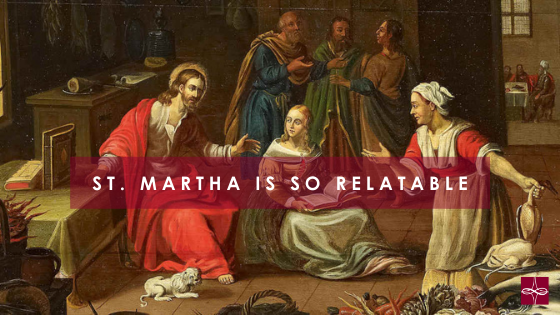

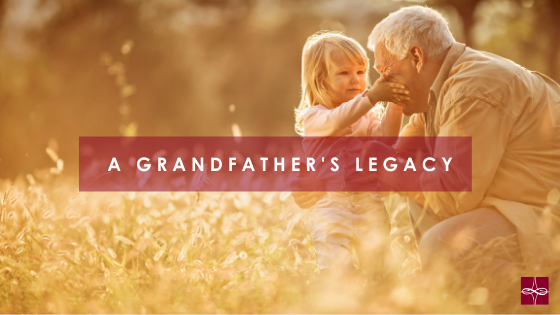

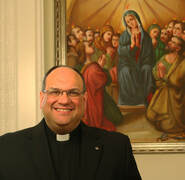
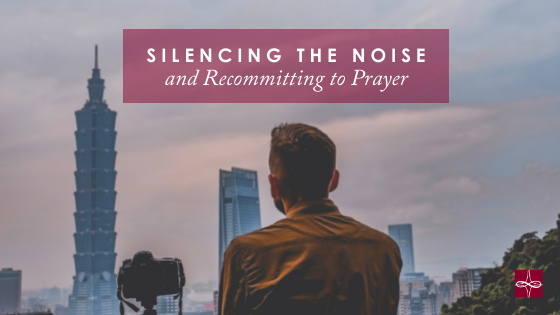




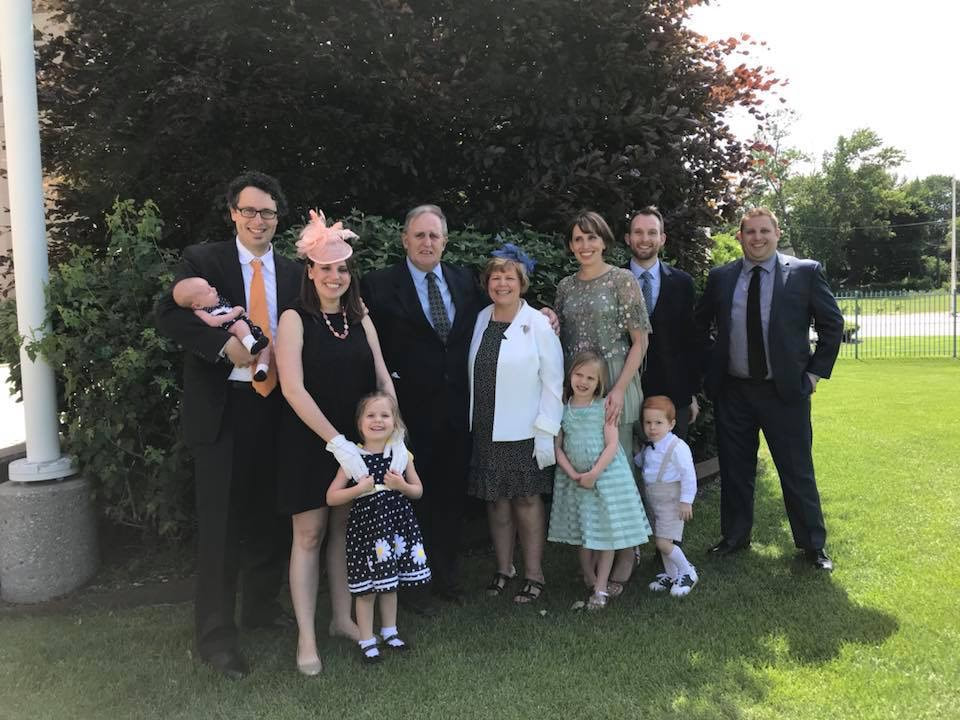
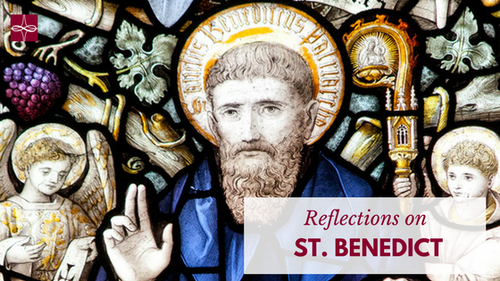

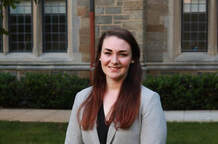
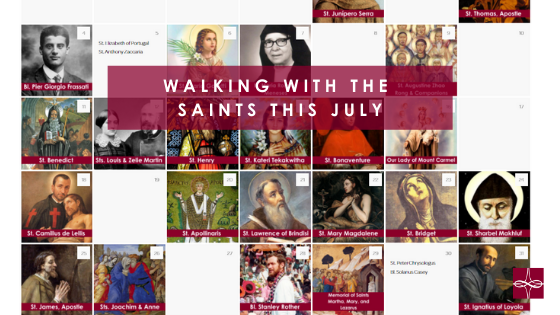

 RSS Feed
RSS Feed